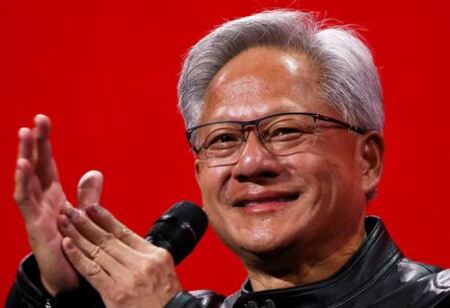
Nvidia Says it Will Resume Sales of 'H20' AI Chips to China


Following Washington's promise to lift licensing restrictions that had halted shipments, US tech company Nvidia announced that it will resume selling its H20 artificial intelligence chips to China.
Sales of the chips were essentially stopped after the US government informed Nvidia in April that a license would be needed to sell them to China, the company said in a filing.
The purpose of the H20 chips was to get over previous export restrictions on Beijing.
NVIDIA stated that it aims to begin delivery shortly after receiving assurances from the US government that licenses will be granted.
Jensen Huang, the CEO of Nvidia, has increased his advocacy against export restrictions in recent months, claiming that they impede American technological supremacy. Huang claimed in May that Nvidia's market share in China had already been reduced by almost half due to chip restrictions.
Also Read: Lisa Tzwu-Fang Su: The Woman Leader Powering the Future of Computing
The possible shift in US policy comes after Huang met with U.S. President Donald Trump last week.
Huang had reinforced Nvidia's support for the administration's onshoring and job development initiatives during the discussions, as well as the company's goal of making America the world leader in artificial intelligence.
Last month, Washington and Beijing reached an agreement on a draft trade framework that permitted the U.S. to loosen its restrictions on tech exports and China to reduce its export rules on rare earth.
Huang also revealed the RTX PRO, a new "fully compliant" GPU that he claimed was perfect for logistics and smart factories. It was unclear whether the GPU's compliance with export regulations to China was the subject of the reference.
There have been rumors since May that Nvidia was developing a less sophisticated AI chip than the H20 for the Chinese market.
Also Read: Growing Healthy Food and Meeting SDGs through Technology
Nvidia also acknowledged that Huang was in China at the time and had met with industry and government representatives to talk about the advantages of AI and how researchers might develop safe and secure AI.
Some chip analysts had anticipated that domestic Nvidia substitutes like Huawei would benefit from the April implementation of export restrictions on the H20 chip.
Despite recent advancements, China's AI chip environment still lags behind Nvidia and chip foundries such as Taiwan Semiconductor Manufacturing Co.
The tighter US export restrictions coincide with China's faltering economy, whose development is being hindered by a protracted property sector turmoil and hesitant domestic customers.
After economists forecast robust exports amid trade war constraints, China's economy grew 5.2 percent in the second quarter of the year, according to official statistics released.

